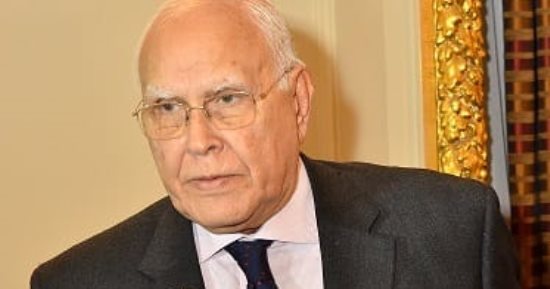Participation of Ambassador Dr. Ezzat Saad, ECFA Director, in the press conference of the Ambassador of the People’s Republic of China on Nancy Pelosi’s visit to Taiwan
August 11, 2022Participation of Ambassador Dr. Mounir Zahran, ECFA Chairman, in the graduation ceremony of the diplomat students nominated to work in the Ministry of Foreign Affairs at the Military College
August 31, 2022
On August 20, 2022, Ambassador Dr. Ezzat Saad, participated with a paper on “The Crisis and the Future of Major Powers Rivalry”, in the symposium organized by the Egypt-China Friendship Association, in cooperation with the Tahrir Institute for Middle East Policy, in Cairo, on “The Future of China-U.S. Relations in light of recent developments in the Taiwan Strait”, in which he indicated that the shock of the Covid-19 pandemic did not affect the hierarchy of global power; The United States remains the world’s largest power, still in command of the world’s monetary and financial system and retaining a global ability to demonstrate power, be it hard or soft. As for China, it continues to rise without hindrance under the leadership of the Communist Party of China, which confirms its position as a peer competitor to the United States, especially since the global financial crisis of 2007-2008, which had a deeper impact than the pandemic on the hierarchy of states, and its manifestations were: The American strategic turning towards Asia during the Obama era, debt management and the issue of combating poverty, the recognition of the need for flexibility in dealing with the two crises, the rise of China to become the second largest global economy, the return of Russia as a global strategic player, and the beginning of the European Union staggering and suffering from one existential crisis after another until pre-Covid-19. The same observations apply to varying degrees for the other major players: India is no closer to catching up with China, and Brazil is still dependent on raw material markets.
Contrary to the precedent of the Great Depression, Washington and Beijing worked together as “tenable stakeholders” with the common goal of emerging from the global depression. Conversely, the United States under Trump showed no interest, nor did China, in wearing the mantle of global leadership, either separately or jointly, when the pandemic hit the world. In contrast to Washington, which turned in on itself, China provided the vaccine to many countries in the developing world, especially Africa, at a time when the positions of Western countries were characterized – at least initially – by selfishness. At the strategic level, the gap has deepened between the alliance system that the United States focused on in Europe, Asia and the Pacific, and a rising China. The U.S. withdrawal from Afghanistan came to embody a decade of U.S. decline. This has fueled skepticism of allies and rivals alike regarding America’s willingness and ability to advance its worldview with the kind of determination that prevailed during the first Cold War.
Regardless of the intense provocations raised by the visits of high-ranking U.S. officials to Taiwan from time to time recently, however, according to some American writers, besieging Russia and defeating Putin in the Ukrainian crisis may require China’s cooperation and persuasion to work with the United States to confront Russia, especially that its economy is deeply intertwined with the U.S. and global economy and its holding of more than a trillion dollars worth of U.S. debt in the form of U.S. Treasury bonds. It also benefits from the cumulative effect of U.S. investment in China, and it needs access to foreign markets. This is at a time when these facts participate in shaping China’s behavior and the determinants of any future confrontation with the United States. In this context, some argue that the United States has never, nor should it, found its entire foreign policy on human rights, and that if it is true that the Communist Party views the United States as an adversary, it has always been willing to engage diplomatically. It has also repeatedly advocated for the sanctity of state borders and acceptance of compromise on issues such as trade and climate change. Even China’s rhetoric on Taiwan may be more restrained compared to how the United States has historically dealt with Latin America. In this context, they suggest that Washington take specific steps such as: softening the rhetoric, removing the tariffs that were imposed during Trump’s era on Chinese goods in return for reducing Beijing’s support for Putin…etc.






